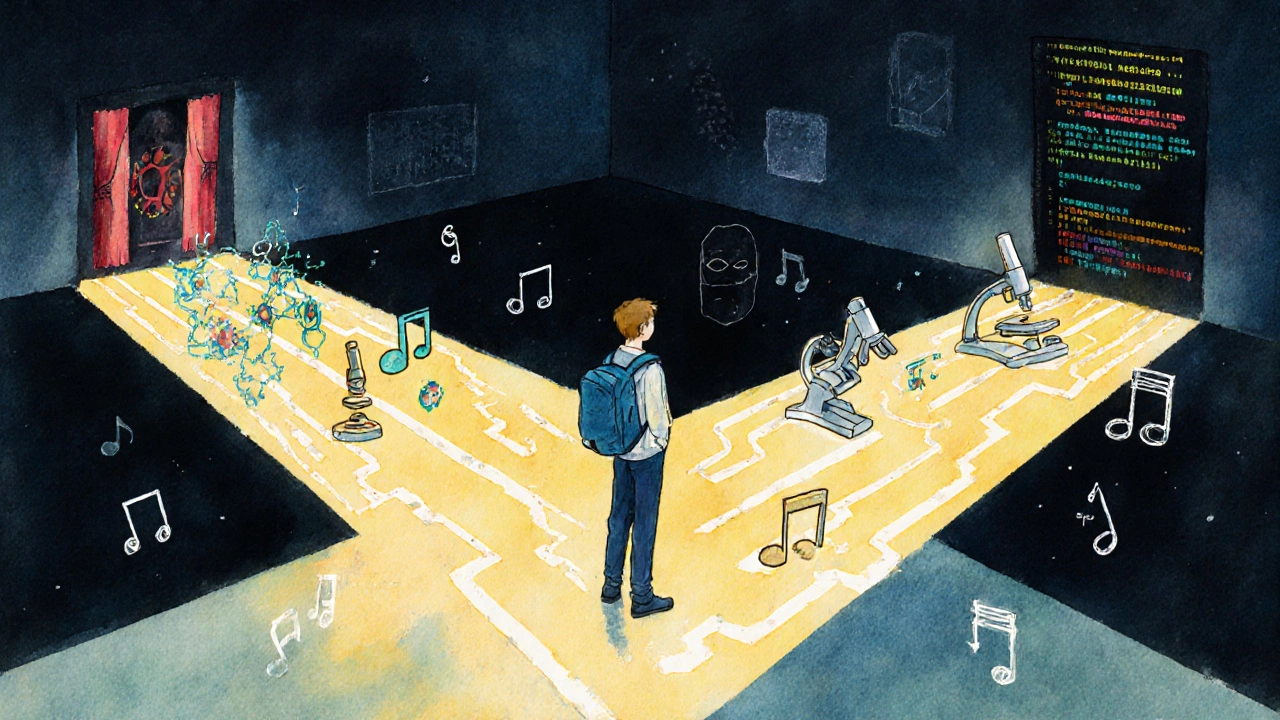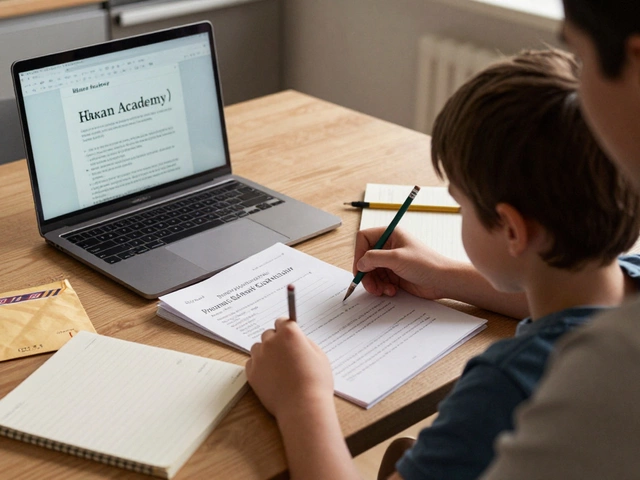When students in the UK and other countries hear "A-levels," they often think of exams, stress, or university entry. But what’s actually taught in these courses? It’s not just harder GCSEs. A-levels are specialized, in-depth programs designed to prepare students for university-level study-or direct entry into skilled careers. Each subject is structured like a mini-degree, with clear focus, rigor, and real-world application.
How A-Level Subjects Work
A-levels are taken over two years, typically between ages 16 and 18. Students usually pick three to four subjects to study in depth. Unlike GCSEs, where you cover a broad range of topics, A-levels demand deep understanding. You don’t just memorize facts-you analyze, evaluate, and apply knowledge.
There are over 40 A-level subjects offered by exam boards like AQA, Edexcel, OCR, and Cambridge International. But not all schools offer every subject. Common ones include Mathematics, Biology, Chemistry, Physics, English Literature, History, Psychology, Economics, Computer Science, and Art & Design. Each has its own syllabus, but all follow the same pattern: theory, practical work (where relevant), and exam-based assessment.
What’s Taught in Core Science Subjects
If you take Biology, you’re not just learning the parts of a cell. In Year 12, you study cell structure, biochemistry, and how organisms exchange materials. By Year 13, you’re analyzing genetic inheritance patterns, ecological interactions, and human physiology. Practical labs are mandatory-you’ll dissect specimens, run chromatography tests, and collect real data to write up as coursework.
Chemistry dives into atomic structure, bonding, and organic synthesis. You’ll learn how to predict reaction outcomes, calculate yields, and interpret spectra. Physics covers mechanics, electricity, waves, and quantum phenomena. You’ll solve problems using equations, design experiments, and use software like Logger Pro to model motion and forces.
These aren’t abstract ideas. A-level Biology students in England have studied real data from NHS health surveys. Chemistry students have analyzed water samples from local rivers. Physics students have built simple circuits that power LED arrays-exactly what you’d see in engineering labs.
Humanities and Social Sciences: Beyond Memorization
History isn’t about dates and names. In A-level History, you’ll debate interpretations of events like the Cold War or the French Revolution. You’ll read primary sources-speeches, letters, government reports-and write essays that argue a position based on evidence. One student in Manchester analyzed propaganda posters from WWII to explain how governments shaped public opinion.
Psychology teaches you how to design surveys, conduct observations, and interpret statistical results. You’ll study cognitive biases, memory models, and mental health disorders. You might even replicate classic experiments like Milgram’s obedience study (ethically, of course). These skills aren’t just for university-they’re useful in marketing, HR, and even customer service.
Economics combines theory with real-world data. You’ll learn supply and demand curves, but also analyze inflation rates in the UK, unemployment trends in London, and the impact of Brexit on trade. You’ll use graphs from the Bank of England and Office for National Statistics. No textbook can replace that.
Mathematics and Computer Science: Logic in Action
A-level Maths splits into Pure Maths, Statistics, and Mechanics. Pure Maths covers algebra, calculus, trigonometry, and proof. Statistics teaches you how to interpret data distributions, perform hypothesis tests, and use normal distributions to predict outcomes. Mechanics applies maths to motion-calculating how fast a car stops, how a bridge holds weight, or how a rocket ascends.
Computer Science is more than coding. You’ll learn binary systems, data structures, algorithms, and computational thinking. You’ll write programs in Python or Java to solve problems like sorting lists or simulating traffic flow. You’ll also study computer architecture-how processors work-and ethical issues like data privacy and AI bias. One student in Bristol built a program that predicted local bus delays using real-time data feeds.

Arts and Creative Subjects: Skill Meets Theory
Art & Design isn’t just painting. You’ll develop a portfolio over two years, responding to themes like identity, environment, or technology. You’ll study artists like Frida Kahlo or Ai Weiwei, analyze their techniques, and recreate them in your own style. You’ll also write critical essays that connect your work to cultural movements.
Music involves theory, composition, and performance. You’ll learn harmony, counterpoint, and musical forms. You might compose a piece in the style of Bach or arrange a pop song for orchestra. Performance is assessed live-you’ll play or sing in front of an examiner, just like a professional audition.
Drama and Theatre studies combine acting, directing, and critical analysis. You’ll study plays by Shakespeare, Beckett, or contemporary writers. You’ll design lighting, write scripts, and perform scenes. You’ll also write a 3,000-word portfolio analyzing how a director interpreted a classic play.
Why A-Level Content Matters Beyond Exams
What you learn in A-levels doesn’t vanish after the final exam. Employers and universities value the skills you develop: independent research, critical thinking, time management, and structured writing. A student who studied Economics can analyze a business report. Someone who took Psychology understands why people make irrational choices. A Computer Science graduate can explain how an app works-not just how to use it.
These subjects are also gateways. You can’t study Medicine without A-level Chemistry and Biology. You can’t do Engineering without Maths and Physics. Even creative degrees like Graphic Design or Film Studies expect strong portfolios and analytical writing skills from A-level Art or English Literature.
Choosing the Right Subjects
Don’t pick subjects just because they’re "easy" or your friends are doing them. Look at university requirements. If you want to study Architecture, you’ll need Maths and Art. If you’re aiming for Law, History or Politics gives you the analytical edge. Some universities prefer facilitating subjects-Maths, English, Sciences, Languages, History, Geography-because they open more doors.
Also, think about your strengths. If you love writing essays, English Literature or History might suit you. If you enjoy solving puzzles and patterns, Maths or Computer Science could be a better fit. Talk to teachers, check exam board specifications online, and look at past papers. You’ll see exactly what’s expected.

Changes in A-Level Content for 2025
The curriculum has evolved. In 2025, A-level Biology includes more on genomics and ethical issues in genetic editing. Computer Science now covers machine learning basics and cybersecurity principles. Economics includes modules on sustainable development and global supply chains. These updates reflect real-world changes-not just textbook theories.
Practical assessments have also changed. Many subjects now include coursework or project-based tasks that count toward your final grade. This means your work over two years matters as much as your exam performance.
What Happens After A-Levels?
A-levels lead to university, apprenticeships, or direct employment. Around 70% of A-level students in the UK go to university, with most entering degrees related to their subjects. A student with A-levels in Physics and Maths might go into engineering. Someone with Psychology and Sociology might study social work or education.
But it’s not just about degrees. Many apprenticeships in tech, healthcare, and engineering now require specific A-level grades. For example, a cybersecurity apprenticeship might ask for A-level Computer Science and Maths. A-levels are the foundation-not the finish line.
Are A-levels harder than GCSEs?
Yes, significantly. A-levels require deeper understanding, independent study, and the ability to apply knowledge in unfamiliar contexts. You’re expected to think critically, not just recall facts. The jump from GCSE to A-level is one of the biggest in the UK education system.
Can I take A-levels without doing GCSEs in the same subject?
Yes, but it’s challenging. Most schools recommend having a GCSE in the subject at grade 6 or above. However, if you’re highly motivated and have strong foundational skills-like self-studying Maths or reading widely in History-you can still succeed. Many adult learners take A-levels without prior GCSEs.
Which A-level subjects are best for university?
The most widely accepted "facilitating subjects" are Maths, English Literature, Physics, Biology, Chemistry, Geography, History, and Languages. These keep your options open for most degrees. If you’re unsure of your future path, choosing two or three of these gives you flexibility.
Do A-levels include coursework?
It depends on the subject and exam board. Sciences often have practical assessments counted in your final grade. Art, Design, Drama, and Music include portfolios or performances. Some subjects like Psychology and Sociology have coursework components. Most exams are still 100% final, but coursework is growing.
How are A-levels graded?
A-levels are graded from A* to E. An A* is awarded to the top 8-10% of students. Grades are based on a combination of exams and, where applicable, coursework or practical assessments. The grading is standardized across the UK, so an A-level in London is the same as one in Belfast or Cardiff.
Final Thoughts
A-levels aren’t just a stepping stone-they’re a training ground. What’s taught in these subjects shapes how you think, solve problems, and understand the world. Whether you’re studying the human brain, the structure of DNA, or the rhythm of a Shakespearean sonnet, you’re building skills that last far beyond the exam hall.
Choose subjects that challenge you, not just ones that seem easy. Talk to your teachers, read the syllabus, and look at past papers. The content is rigorous-but it’s also empowering. You’re not just preparing for university. You’re preparing to think like a professional, a researcher, or a creator.






